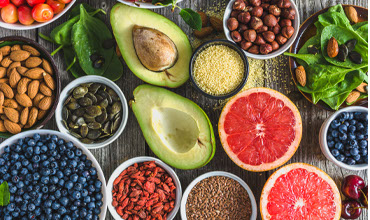All foods can fit into a healthy lifestyle for families. But how? Reframing how we think about food and nourishment might be the answer for the gut, mind and waistline. Ditch the restrictive mindset and focus on adding nutrients to your family meals in 2024.
The gastrointestinal system thrives on diversity and when the gut is happy, mental, emotional and physical health will follow. Step out of that comfort zone and diversify the meals you prepare for your family. Here are 24 foods to add to your plate in 2024.
Probiotics
Probiotics are healthy bacteria that live in the gastrointestinal tract. They are beneficial for immune and gut health and are found in:
Yogurt. Choose ‘no added sugar’ and look for ‘live and active cultures’ on the ingredient list. Not a fan of yogurt? Try kefir or cottage cheese.
Fermented foods. Sauerkraut, kimchi, miso and kombucha help provide a desirable environment for a healthy gut microbiome.
High Fiber +
Antioxidant-Rich Foods
Fiber plays a critical role in gastrointestinal health and blood sugar regulation. Pre-biotics are fiber-containing foods that feed probiotics. Antioxidants fight against free radicals, reduce inflammation, support brain health and more. Most fruits and vegetables contain fiber and antioxidants. There are many varieties of antioxidants so diversity is key, even within food groups.
- Coffee. Don’t give up your daily cup of joe! One to two cups daily is ideal.
- Dark chocolate. Even this sweet treat, in moderation, has health benefits.
- Berries. Rich in fiber and antioxidants, berries are a nutritional powerhouse.
- Leafy green vegetables. Kale, arugula, spinach or collard greens are great sources of vitamins A, C, K and B.
- Cruciferous vegetables. Broccoli and cauliflower provide vitamins C, K, calcium, potassium and magnesium.
- Beets. High in nitrates, beets positively affect blood flow, may reduce blood pressure and can improve athletic performance. Beets contain anthocyanin which is only found in purple produce.
- Spaghetti squash. Any yellow/orange squash, carrots or sweet potatoes contain beta-carotene which supports eye health and vision. Substitute spaghetti squash for regular noodles or include it with pasta in the next Italian dish.
- Quinoa. Considered the whole grain queen, quinoa is a great source of iron, protein and fiber. Protein and fiber provide satiety and help regulate blood sugar.
Healthy Fats
Unsaturated fats raise ‘good’ cholesterol (HDL), increase fullness and have beneficial effects on the heart and brain. Omega-3 fatty acid is a healthy fat that reduces inflammation. Some food sources include:
- Walnuts. These nuts are exceptionally high in Omega-3s, but all nuts contain desirable fats.
- Seeds. Chia, flax and hemp are great options that can be added to baked goods or energy balls to enhance digestive, heart and brain health.
- Olive oil. Great to cook with or add to foods when trying to boost healthy fat consumption.
- Avocados. This fruit is a great source of healthy fat, fiber, potassium and many more vitamins and minerals.
- Fatty fish. Salmon and herring are high in Omega-3s and are also a good source of vitamin D.
Vitamin D
Vitamin D is a fat-soluble vitamin that acts like a hormone and may play a role in mental and physical health. The sun is a great source of vitamin D but most individuals do not get enough sunlight to meet vitamin D requirements.
- Mushrooms. The only produce that contains vitamin D! Mushrooms also support a healthy gut, brain and immune system.
- Egg yolks. Contrary to popular belief, egg yolks are extremely nutrient-dense and are full of B vitamins, vitamin D, choline and many more nutrients.
Immune-boosting Foods
The foods listed below contain anti-inflammatory properties that support immunity, longevity, heart and overall health.
- Turmeric. Rich in color, turmeric has been shown to improve mood, cholesterol levels and eye health.
- Cilantro. This simple herb can be added to meals, dips, and even tossed into a salad for a positive impact on mood, anxiety, blood sugar and heart.
- Garlic. Potent in flavor, garlic can help detox the body and has natural antibiotic components.
- Onions. Inexpensive and tasty, onions have antibacterial properties that support respiratory, gut and bone health.
- Bone Broth. Known for immunity-boosting, it’s a great source of collagen which supports healthy skin, joints and bones.
- Grass-fed meats. Meat is an excellent source of iron-rich protein that contains antioxidants and Omega-3s, making it a great immune-boosting option.
- Lentils. Especially for non-meat eaters, lentils are a great source of protein and iron. Change it up and try other legume sources such as chickpeas or beans for similar nutritional and health benefits.
Remember that adding, not subtracting foods items will help boost your health. Get that grocery list going and start diversifying your family meals in 2024.
Margaret Low is a registered dietitian nutritionist who lives in Austin with her family. She works with families, parents and athletes on how to fuel well and feel better. Find her at www.mlownutrition.com and www.beyond-miles.com.


















